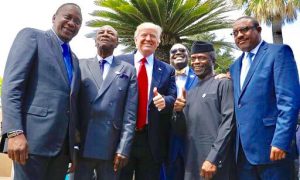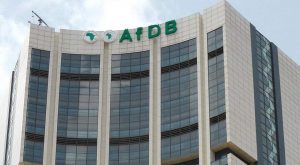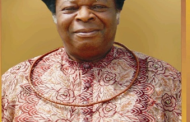Generally regarded as a “neutral, honest, high-calibre” personality, Mary Robinson’s leadership of the three-person team reviewing allegations of ethical breaches against the president of the African Development Bank, (AfDB), Dr Akinwumi Adesina, has been accepted as the most credible way out of the crease, especially for Adesina, should he be exonerated the second time. But people are also asking if there isn’t a larger point in having a Westerner do this job?

Dr Akinwumi Adesina, embattled president, AfDB
In other words, is it possible for this to be an innocent exercise in which Mary Robinson’s honesty and international reputation are all that counts? When is the African agency going to be privileged if it cannot be privileged in resolving matters in which Africa is at the core as in this case?
Questions are popping up along this line, describing investiture of Robinson as contrary to common sense and a case of ‘transparent imperialism’. “My worry is the idea and precedent of asking a non-African to rule over an African issue. Is there no qualified and neutral African on the continent and the Diaspora?”
Some of those looking at the issue from this lens contend it smacks of a desperate attempt to appease the US and the West, drawing attention to the paradox of insisting on African solutions for African problems in managing Africa’s many flash points but going for non-African agency when it is otherwise.
While conceding to the difficulty of an essentialist conception of Africa in the current global order, critics of the choice insist there is an image problem about bringing in a non-African to authenticate claims of ethical breaches. The argument is that while all cases of corruption must be dealt with by all means, irrespective of who is involved, the questions about who, how and why such an issue was dealt with will always be important!

African and non-African leaders

An African instrument or instrument for Africa?
Outside of the geopolitics of the allegations against Adesina, there are no reservations that Mary Robinson is the person for the job. The former leader of Ireland is regarded to be about the most eminently qualified personality to act as a witness of truth. Her involvement in Africa has been in the continent’s most trying times and places. She has the credibility to reconcile the differing actors. But in an African issue in which the contending interests are the United States on one side and many (ex)-African leaders, is it only when a non African presides over the process that it is credible? Is this not power speaking?
Specifically, Mary Robinson is not known to be against Nigeria whose candidate Adesina still is even as she won’t play Nigeria’s game either, should there be such a game in the matter. According to someone well located in global governance, “Robinson will do her job. If Adesina is exonerated, it will be because Robinson believes the case against him is weak and vice-versa”. Intervention was told all of that is good for probity but not what the ascendancy of the former Irish president mean in terms of gain or loss of influence by Nigeria and Africa on the process.
It is not clear if she emerged as a consensus of the different sides in the matter. That is very possible since she could not have come in without the Board endorsing that. The point, however, is how it may be an Adesina today over allegations of ethical breaches but completely someone and a different issue tomorrow and involving an even more sensitive issue.
For now, stakeholders and shareholders in international finance, great power politics in Africa and the crisis of African agency in international politics are watching and waiting for which direction the review goes.




























